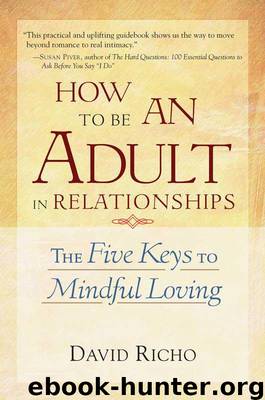How to Be an Adult in Relationships by Richo David & Kathlyn Hendricks

Author:Richo, David & Kathlyn Hendricks [Richo, David]
Language: eng
Format: mobi
Publisher: Shambhala Publications
Published: 2010-08-30T16:00:00+00:00
It was an unspoken pleasure that having . . . ruined so much and repaired so little, we had endured.
—LILLIAN HELLMAN
The Past in the Present
Remembered bouquets long since dead. . .left in my memory the bygone charm with which I. . .burdened this new bouquet.
—HENRI MATISSE
We humans memorialize our past. But eventually our archaic needs intrude, bill in hand, to present their unpaid claims. We deal with our past issues so that they do not come up over and over in our present relationships—or if they do, we notice their appearance and take responsibility for it. Without consciousness of our past, we may appear to be involved in an adult relationship, but underneath we are playing out a scenario from long ago. Memories of the past will arise in direct proportion to the rise of intimacy. This is because both the past and the present held out or hold out the chance to receive what we always yearned for: attention, acceptance, appreciation, affection, and being allowed and encouraged to be who we are.
How can we tell whether the issue that is troubling us in an adult relationship is a present-day issue or a carryover from the past? By mindful self-examination. If Mother so absorbed and contaminated my experience of women, what chance do I have to see this woman as she really is? When I feel a familiar panic, experience an anger that surprises me, or react with more intensity than fits the circumstance and do not know why, then I may surmise I am not really seeing my partner’s face but my mother’s. This becomes especially clear when I feel more uncomfortable and hold on to pain longer than fits my situation. Only issues that carry the weight of an unresolved, abusive, or still resented past could account for such overreaction. (And in a sense, it is not truly an overreaction, since the inner child is responding to a trauma from the past that still smolders.)
All of us experience moments of feeling powerless, scared, trapped, compelled, and out of control. We are hearing the voice of the inner child calling for our attention and our adult intercession. The inner child does not know how to make her case directly, so she stammers her message through diffident acts and pitifully awkward feelings. Once we understand this consciously, we automatically become more adult and more compassionate toward ourselves. When consciousness connects our present experiences to its childhood determinants, we gain a sense of expanded meaning in our life experience. This is part of our capacity to self-soothe.
Reasoned, adult behavior at work and childish out-of-control behavior at home with my partner point to the difference between the powers of the present and past to ignite us. When the fires of the past flare up again, we treat issues and conflicts compulsively, and they seem to have an either/or quality, obstructing the opportunity for compromise or negotiation. An ordinary transaction can replicate an early scenario that still carries pain. We are usually blind to its connection to our past.
Download
This site does not store any files on its server. We only index and link to content provided by other sites. Please contact the content providers to delete copyright contents if any and email us, we'll remove relevant links or contents immediately.
| Codependency | Conflict Management |
| Dating | Divorce |
| Friendship | Interpersonal Relations |
| Love & Loss | Love & Romance |
| Marriage | Mate Seeking |
Doing It: Let's Talk About Sex... by Hannah Witton(8569)
The 5 Love Languages: The Secret to Love That Lasts by Gary Chapman(8536)
Should I Stay or Should I Go? by Ramani Durvasula(6803)
The Road Less Traveled by M. Scott Peck(6651)
The Lost Art of Listening by Michael P. Nichols(6486)
Daring Greatly by Brene Brown(5653)
We Need to Talk by Celeste Headlee(4883)
Beartown by Fredrik Backman(4438)
Men In Love by Nancy Friday(4344)
The State of Affairs by Esther Perel(3947)
The Rules Do Not Apply by Ariel Levy(3916)
How To Win Friends and Influence People by Dale Carnegie(3785)
Reflections Of A Man by Mr. Amari Soul(3711)
The Ethical Slut by Janet W. Hardy(3514)
Algedonic by r.h. Sin(3512)
Pillow Thoughts by Courtney Peppernell(3421)
Finding My Forever by Heidi McLaughlin(3316)
He's Just Not That Into You by Greg Behrendt & Liz Tuccillo(3313)
I Love You But I Don't Trust You by Mira Kirshenbaum(3238)
